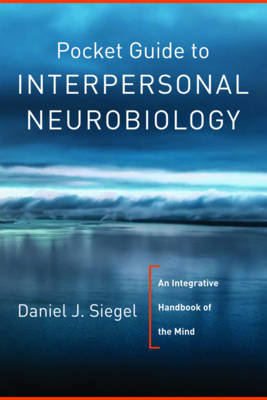
Pocket Guide to Interpersonal Neurobiology
An Integrative Handbook of the Mind
Seiten
2012
WW Norton & Co (Verlag)
978-0-393-70713-7 (ISBN)
WW Norton & Co (Verlag)
978-0-393-70713-7 (ISBN)
- Titel z.Zt. nicht lieferbar
- Versandkostenfrei
- Auch auf Rechnung
- Artikel merken
The central concepts of the theory of interpersonal neurobiology.
Many fields have explored the nature of mental life from psychology to psychiatry, literature to linguistics. Yet no common “framework” where each of these important perspectives can be honored and integrated with one another has been created in which a person seeking their collective wisdom can find answers to some basic questions, such as, What is the purpose of life? Why are we here? How do we know things, how are we conscious of ourselves? What is the mind? What makes a mind healthy or unwell? And, perhaps most importantly: What is the connection among the mind, the brain, and our relationships with one another?
Our mental lives are profoundly relational. The interactions we have with one another shape our mental world. Yet as any neuroscientist will tell you, the mind is shaped by the firing patterns in the brain. And so how can we reconcile this tension—that the mind is both embodied and relational? Interpersonal Neurobiology is a way of thinking across this apparent conceptual divide.
This Pocket Guide to Interpersonal Neurobiology is designed to aid in your personal and professional application of the interpersonal neurobiology approach to developing a healthy mind, an integrated brain, and empathic relationships. It is also designed to assist you in seeing the intricate foundations of interpersonal neurobiology as you read other books in the Norton Series on Interpersonal Neurobiology.
Praise for Daniel J. Siegel's books:
“Siegel is a must-read author for anyone interested in the science of the mind.” —Daniel Goleman, author of Social Intelligence: The New Science of Human Relationships
“[S]tands out for its skillful weaving together of the interpersonal, the inner world, the latest science, and practical applications.” —Jack Kornfield, PhD, founding teacher of the Insight Meditation Society and Spirit Rock Center, and author of A Path With Heart
“Siegel has both a meticulous understanding of the roles of different parts of the brain and an intimate relationship with mindfulness . . . [A]n exciting glimpse of an uncharted territory of neuroscience.” —Scientific American Mind
“Dr. Daniel Siegel is one of the most thoughtful, eloquent, scientifically solid and reputable exponents of mind/body/brain integration in the world today.” —Jon Kabat-Zinn, PhD, author of Wherever You Go, There You Are, Full Catastrophe Living, and Coming to Our Senses
Many fields have explored the nature of mental life from psychology to psychiatry, literature to linguistics. Yet no common “framework” where each of these important perspectives can be honored and integrated with one another has been created in which a person seeking their collective wisdom can find answers to some basic questions, such as, What is the purpose of life? Why are we here? How do we know things, how are we conscious of ourselves? What is the mind? What makes a mind healthy or unwell? And, perhaps most importantly: What is the connection among the mind, the brain, and our relationships with one another?
Our mental lives are profoundly relational. The interactions we have with one another shape our mental world. Yet as any neuroscientist will tell you, the mind is shaped by the firing patterns in the brain. And so how can we reconcile this tension—that the mind is both embodied and relational? Interpersonal Neurobiology is a way of thinking across this apparent conceptual divide.
This Pocket Guide to Interpersonal Neurobiology is designed to aid in your personal and professional application of the interpersonal neurobiology approach to developing a healthy mind, an integrated brain, and empathic relationships. It is also designed to assist you in seeing the intricate foundations of interpersonal neurobiology as you read other books in the Norton Series on Interpersonal Neurobiology.
Praise for Daniel J. Siegel's books:
“Siegel is a must-read author for anyone interested in the science of the mind.” —Daniel Goleman, author of Social Intelligence: The New Science of Human Relationships
“[S]tands out for its skillful weaving together of the interpersonal, the inner world, the latest science, and practical applications.” —Jack Kornfield, PhD, founding teacher of the Insight Meditation Society and Spirit Rock Center, and author of A Path With Heart
“Siegel has both a meticulous understanding of the roles of different parts of the brain and an intimate relationship with mindfulness . . . [A]n exciting glimpse of an uncharted territory of neuroscience.” —Scientific American Mind
“Dr. Daniel Siegel is one of the most thoughtful, eloquent, scientifically solid and reputable exponents of mind/body/brain integration in the world today.” —Jon Kabat-Zinn, PhD, author of Wherever You Go, There You Are, Full Catastrophe Living, and Coming to Our Senses
Noted neuropsychiatrist Daniel J. Siegel, MD, is clinical professor of psychiatry at the University of California Los Angeles School of Medicine, and executive director of the Mindsight Institute in LA. He is founding editor of the Norton Series on Interpersonal Neurobiology.
| Erscheint lt. Verlag | 3.4.2012 |
|---|---|
| Reihe/Serie | Norton Series on Interpersonal Neurobiology |
| Verlagsort | New York |
| Sprache | englisch |
| Maße | 142 x 211 mm |
| Gewicht | 491 g |
| Themenwelt | Geisteswissenschaften ► Psychologie ► Biopsychologie / Neurowissenschaften |
| Medizin / Pharmazie ► Medizinische Fachgebiete ► Psychiatrie / Psychotherapie | |
| Studium ► 1. Studienabschnitt (Vorklinik) ► Physiologie | |
| ISBN-10 | 0-393-70713-X / 039370713X |
| ISBN-13 | 978-0-393-70713-7 / 9780393707137 |
| Zustand | Neuware |
| Haben Sie eine Frage zum Produkt? |
Mehr entdecken
aus dem Bereich
aus dem Bereich


